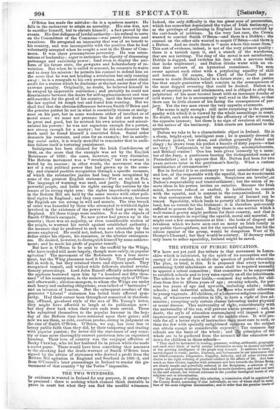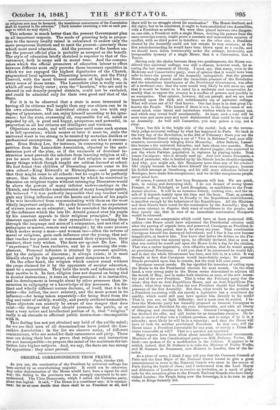THE SYSTEM OF PUBLIC EDUCATION.
WE have not yet paid due tribute to that movement in Lanca- shire which is calculated, by the spirit of its conception and the
energy of its conduct, to settle the question of public education. The plan, in brief, is this. It is proposed that every township containing 2,000 inhabitants or more shall be required annually, to appoint a school committee ; that committee to be empowered to establish schools and to levy rates equally on all the inhabitants. The schools to be of four kinds,—common day schools, for chil- dren from five to fifteen years of age ; evening schools, for per- sons ten years of age and upwards including adults ; infant schools ; and industrial schools, forlitiose who would otherwise be young vagrants. All children, of whatsoever religious classifica- tion, of whatsoever condition in life, to have a right of free ad- mission; excepting only certain classes labouring under physical or moral disease. This universality of right, coincidentally with the universality of the tax, will prevent undue pressure ; and, no doubt, the style of education contemplated will import a great improvement among numbers of the middle class. It will pro- vide for all a better style of instruction than most care to seek, or than the few with specially enlightened 408ions on the subject
can obtain except at considerable expens The common day schools are the basis of the whole ; and principles of the whole are to be gathered from the account -the education set down for children in those schools-
" They shall be instructed in reading, grammar, writing, arithmetic, geography and such other kinds of useful secular information as may be deemed advisable or the growing intelligence of the people may demand. In addition to these,, a sacred regard to truth; justice, kindness, and forbearance in our intercourse with our fellow-creatures; temperance, frugality, industry, and all other virtues con- ducive to the right ordering of practical conduct in the affairs of life. And inas- much as these virtues, together with reverence and love towards the Divine Being, are clearly taught and powerfully enforced in the Scriptures, a selection of ex- amples and precepts inculcating them shall be made therefrom, and read and used in the said schools, but without reference to the peculiar theological tenets of any religious sect or denomination.
"For the purpose of making this selection, a commission shall be appointed by the County Board, consisting of nine individuals, no two of whom shall be mem- bers of the same religious denomination; and in order that the peculiar tenets of
no religious sect may be favoured, the unanimous concurrence of the Commission shall be required in the selection." [Each member exercising a veto on each pas- sage to which he may object.] This scheme is much better than the present Government plan in all important respects. The mode of granting help in propor- tion to the money locally raised is calculated to endow only the more prosperous districts and to .omit the poorest—precisely those which most need education. Ahd the pressure of the burden un- der the present official plan is probably as unequal as the benefit. The style of education briefly sketched is superior to that of Go- vernment, both in scope and in moral tone. And the compro- mises which the official promoters of education labour to effect between different sects only provoke those incessant squabbles in which we see engaged the highest dignitaries of the Church, pragmatical local agitators, Dissenting ministers and the Privy Council, with the most blessed confusion of high and low, in every sense of those terms. The Lancashire plan is really one in which all may freely.enter ; even the "heathen," who are said to abound in our densely-peopled districts, could not be excluded, and could be admitted only for their own good and that of the State.
For it is to be observed that a state is more interested in having all its citizens well taught than any one citizen can be in his own education. The individual citizen can live with any degree of ignorance, and can enjoy himself according to his igno- rance: but the state, overseeing all, responsible for all, aided or impeded by all, is good and happy, prosperous and powerful, in proportion as all her citizens are intelligent and virtuous. Objections are made and will continue until some such system
is in full operation; which sooner or later it must be, since the universal want is too strong to be resisted by sectarian dislikes or professional assumptions. And assumptions are what it encoun- ters. Even Bishop Lee, for instance, in consenting to present a petition from the Lancashire Association, objected to the anti- sectarian part of the plan as if the exclusion of doctrinal in- struction must prevent the scholars from learning religion at all ; yet he must know, that in point of fact religion is one of the many things which though taught are seldom learned at school. He had found that children of Dissenting parents came to his own school—King Edward's at Birmingham—and presumed that they might come to all schools : but he ought to be perfectly aware, that the delicate management by which he contrived to discourse on religious topics without estranging Dissenters would be above the powers of many inferior understandings in the Church, and beneath the condescension of many haughtier spirits. He believed "it was perfectly impossible that any teacher could rain any living influence over the hearts and minds of his pupils if he was interdicted from communicating with them on the moat vitally important subjects. He spoke himself from an experience of sixteen years as an educator; and he reminded the deputation of the influence which the late pr. Arnold gained over his pupils by his constant appeals to their religious principles." By his constant appeals rather to their sympathies—by teaching them through the language and mien of a companion, and not that of a pedagogue or master, remote and estranged ; by the same process which makes many a man—and woman too—often the reverse of moral or religious, gain such influence over the young, that nei- ther teacher nor parent can so command their sympathies, their conduct, their very wishes. The facts are against Dr. Lee. His " experience " has been exclusive, and he is assuming the com- plement. Personal influence is attained by personal qualities, not by the subjects of discourse ; it always exists ; it is most blindly obeyed by the ignorant, and moat dangerous to them. On the other hand, the religion which cannot stand without the props claimed for it by the opponents of secular education, must be a superstition. They belie the truth and influence which they ascribe to it. In fact, religion does not depend on being tied to secular instruction ; it rests on other grounds: it is instinctive, and its development is brought about by other processes than in- struction in caligraphy or a knowledge of dry measures. Its dis- tinct and wholly different nature declares, of itself, that it is the better—the loftier, the more salutary, and the more potent in its influence—for being taken separately—for being freed from the clog and taint of earthly, worldly, and purely artificial humanities. These objectors can scarcely be aware of one danger that does exist—the danger that they should persuade the public, or at least a very active and intellectual portion of it, that "religion" really is an obstacle to effectual public instruction—incompatible with it.
That feeling has not yet obtained any hold of the public mind; for we see that men of all denominations have joined the Lan- cashire Association : in the list we observe many, of different communions, who are noted for their earnestness and piety. These men are doing their best to prove that religion and instruction are not incompatible—to prepare the mind of the multitude for ini- tiation into higher subjects. And, we say, the facts are too strong for opposition: they must prevail.



























 Previous page
Previous page